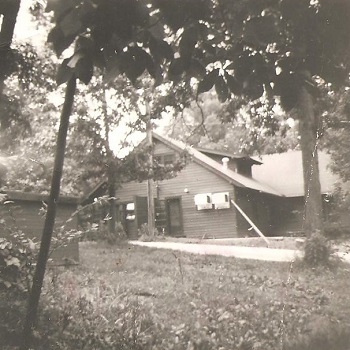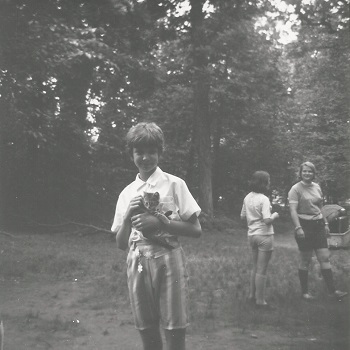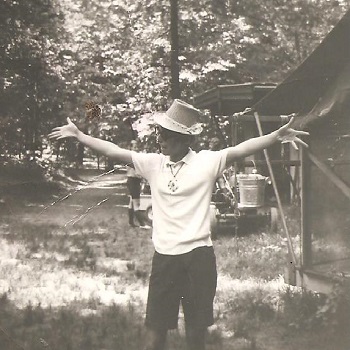Camp Widjiwagan

When I think of my childhood camping experiences, Camp Widjiwagan takes first place in my memory and my heart. A Girl Scout camp in Central Illinois, it was tucked in the woods near Lake Springfield, only twenty miles from my home, but hidden so deeply in the foliage that it might as well have been in the African jungle.
Until the Sunday afternoon I left for camp in the late '60s, I'd never ventured away from home except for an occasional night in my neighbor's camper which was parked safely in their driveway. This time I would be away from my family for two weeks with no contact except for hand-written letters. But in true childlike fashion, the reality of the trip never struck me until the moment my parents dropped me off with my luggage at the entrance gate of Camp Widjiwagan.
Fortunately, my camper neighbor, Susan, came, too, but I don't recall seeing much of her during the entire two weeks. I suddenly found myself in a foreign world with three hundred other Girl Scouts and several camp counselors who wore odd hats and nametags with strange names, such as Happy and Quigley.
I was assigned to a semicircle of tents called Ranch Unit down a forested dirt pathway amidst a maze of other dirt pathways. Our tents were sturdy half-tent, half-cabin structures with wooden floors and screen doors, roofed with tent tarp, furnished with bunk beds. After we were assigned to a tent—four girls to a tent—we were instructed to lower the tarp on the outside of our screen windows. The lazy summer night would soon be descending upon our new home.
I was fine until I saw the spider. Big as the palm of my hand, it parked on the screen window as if it belonged there and I didn't. It strummed terror across every nerve in my body and generated instant tears for my beloved parents and my dear brothers and sisters who were zooming home in a station wagon with an extra seat that should've been occupied by me. Little did I know that it was the largest spider—save for the "display spider" in the canning jar at the lodge—I would see during the entire two weeks. Of course, I pictured two or three of them knitting their little tentacles in some shady spot under my bunk bed, waiting patiently for me to lie down and close my eyes.
Homesickness struck the "weak ones" quickly. The next day, Monday, a camper in the adjacent tent was whisked away with a raging case of it. Rumor had it that she'd cried all night. None of us saw her parents arrive. Was there a stretcher? An ambulance? We never knew. She was simply gone. Like a fast-spreading plague, it could happen to any of us.

My tent mates were okay, as tent mates go. I don't have any vivid memories of them, one way or the other. It was the counselors who became like perfected versions of our moms to each of us. They did everything you could ever want a mom to do who had nothing on her agenda but "me." They sang on the way to dinner, leading our troop up the dusty trail to the lodge like a large choir. We never walked without singing. Most of our songs were from "The Sound of Music," only four years beyond its box-office release, as well as lively camp tunes, such as "The Happy Wanderer." One song I will never forget was a sentimental tune called "Today." It spoke of blossoms clinging to the vine, of tasting strawberries, of feasting at tables and sleeping in clover. Though it seems better suited for philosophers and dreamers than for adolescents, it became the camp favorite. Even today, the sweet melody, along with my memories of young feet tramping on dusty trails, remains a special part of this dreamer's repertoire. I've never forgotten it.
Nor did I forget the letters—the precious letters. The camp counselors passed them out every evening. Our stomachs were full after supper at the lodge, and twilight was gathering amid all the choruses of crickets and cicadas in the surrounding trees. In Ranch Unit, about fifty of us gathered around our campfire circle, waiting for our names to be called—or not called. Fortunately for me, my mother enjoyed writing letters. I can't remember the subject of a single one of them, but each time my name was called, I remember holding a coveted "piece of home" in my hands in this strange, wooded land.
During the hot summer afternoons, we swam in an inlet of Lake Springfield. I didn't know how to swim, but lessons were available for all interested campers. I jumped off the dock once, headfirst, and gave up the lessons. The shallow water was good enough for me. We went row boating, too, way out on the lake (or so it seemed to me). After an abbreviated lesson about how to use the oars, they sent us out, two children to a boat, with instructions to return at a certain time. I recall a sense of high-sea adventure and a fleeting thought that my mother might not approve, but in the end, it didn't matter. We made it back to the dock feeling as if we had accomplished a feat usually reserved for adults, but offered to us as a bonus of our summer camp.
One afternoon we picked blackberries on a trail that ran past a densely wooded unit where each Girl Scout had her own horse, much like a motel has hidden deluxe rooms for special guests. We all decided we would aspire to that particular unit next year. That night a heavy thunderstorm rolled in as we dined in the lodge. While the thunder crashed and the rain poured down the screens, we stayed dry and sang, three hundred voices strong, "My Favorite Things" and "Edelweiss." Afterwards, we filed into the adjoining Great Room, where we gathered around a huge stone hearth and listened to a counselor read stories from The Wind in the Willows.

The days flew by. One night we baked a pot roast on charcoal in a hole in the ground. We covered the kettle with dirt and went hiking, and later that night we each sampled a piece of the roast. Another evening, we whispered together about the advantages and disadvantages of playing tricks on the counselors. We all decided that my job would be to sneak into Quigley's tent in the middle of the night, open the screen door, and squeeze Colgate into her shoes. Of course, we all figured that the successful trickster would become the most endeared camper to our beloved counselors. As instructed, I awoke and tiptoed a few steps into the woods, but the thought of getting caught in the act seemed as alarming to me as encountering the spider on the screen. I don't recall ever being in such limbo before or since, catatonic behind a tree, all alone with the whirring cicadas and numerous unidentified insects watching me, while my cohorts slept. By the time I retreated and slunk back to my cot, I knew I would never become a criminal.
During the last week of camp, we set out on a deeper adventure. Seasoned veterans by now, we launched out on a three-day field trip to a more primitive campsite. Hauling our canteens and our backpacks stuffed with rumpled clothing, we hiked on sun-baked country roads, soft with oily bubbles, for three long miles. The hotter it got, the more we felt like wretched Civil War soldiers on the march. Quarrels broke out regarding the supplies, especially over the canteens that still held a few droplets of life-sustaining water. Finally, we arrived at a lush, shaded lowland along the banks of Lake Springfield. Groves of tall trees permeated the air with the deep green, invigorating scent of pine. We set up our cute little orange pup tents, two campers to a tent. They would suffice for two nights.
For the first time in months—or so it seemed—we spotted "civilization" across the lake. The main bridge over Route 66 (now Interstate 55) spanned the lake about a half-mile from us. I knew that my dad drove across that bridge every morning on his way to work at Sangamo Electric. I fancied waving to him, and I wondered if he would see me. Now, decades later, every time I drive over that bridge, my gaze skims across the lake to the grove of pine trees, still standing tall, and I remember the day I gazed from the other side.
That evening, we finished gathering firewood and commenced cooking our supper of spaghetti when "the torrent" hit. Rain dumped in bucketfuls from the heavens. To the horror of our counselors, within half an hour our plush lowlands became a giant puddle ready-made for skiing on one's derriere. I never learned what happened to the spaghetti; I don't think I cared. Our tents, sleeping bags, and clothing were waterlogged, but we felt overtopped with adventure.
The trucks came and got us. I have no idea "what trucks," but they rescued us and drove us back to Camp Widjiwagan, minus our sleeping bags, which some anonymous kind souls laundered at a Laundromat that we never saw.
A day or two later, our time at Camp Widjiwagan ended. Saying goodbye to our counselors was like leaving a new mother you knew you'd never see again. I later wrote to one of my counselors, and she replied into the following year. But I've lost track of her, except in my memory.
Had I known beforehand about the spider and the rowboat and the moments of midnight hesitation in the woods and the drenching thunderstorm, I might have opted to stay home. But the challenges were part of the larger experience, and conquering them moved them to the special-memories column along with the songs, the counselors, the hiking, the cooking, the scents of wood smoke and pine, and all the blended joys of fresh experiences shared with friends. There is a rich harmony in life that cannot be achieved without the accompanying trials.
Camp Widjiwagan is still one of my favorite memories. Looking back, it is hard for me to believe I was only eleven years old.





